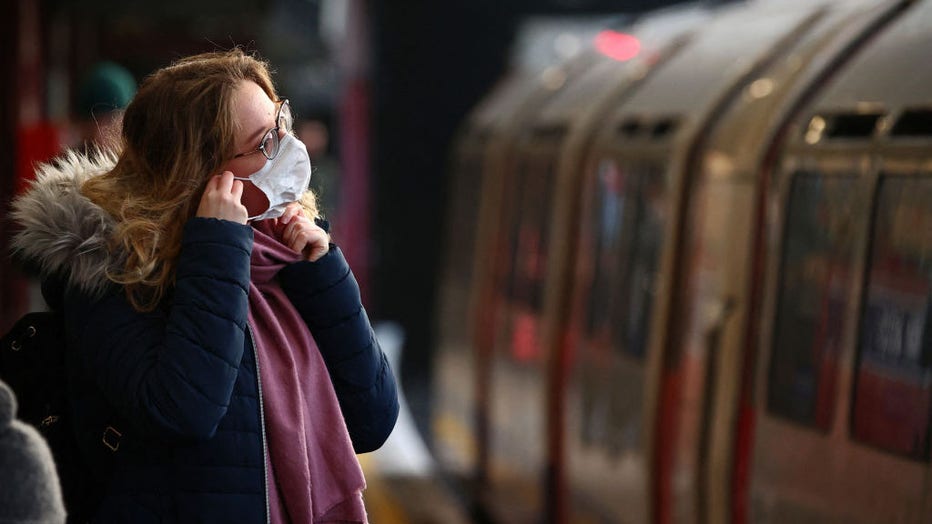COVID-19 vaccine makers exploring if omicron versions of shots are needed
Officials from the top COVID-19 vaccine makers say it will take 100 days or less to develop and ship a shot that specifically targets the new COVID-19 variant omicron — if needed — amid heightened concern over its spread.
Moderna CEO Stephane Bancel said the company believes the omicron variant is highly infectious but it will take at least a "week or two" to determine how much the mutations have impacted the efficacy of current vaccines.
"Depending on how much it dropped, we might decide on the one hand to give a higher dose of the current vaccine around the world to protect people, maybe people at very high risk, the immunocompromised, and the elderly should need a fourth dose," Bancel told CNBC’s "Squawk Box."
Bancel added that a higher 100-microgram dose of the company’s booster shot could be ready much sooner than a tweaked version of its vaccine.
"The higher dose could be done right away but it will be months before the omicron-specific variant is ready to ship in massive quantities," he said.
Bancel emphasized that while a new vaccine could take "60 to 90 days" to be approved by regulators, "the question is... when do you decide to switch?"
"We are getting ready to make that decision as soon as we have the data in the next week or two," he added.

A woman adjusts her face mask at Barons Court Underground station in London on November 29, 2021. - Britain will require all arriving passengers to isolate until they can show a negative PCR test against Covid-19 and is restoring a mandate to wear fa
Meanwhile, Pfizer CEO Albert Bourla said the impact of omicron on the company’s COVID-19 vaccine is not yet known. But he added that Pfizer made its first "DNA template" on Friday, which is the start of the development process of a new vaccine in case it’s needed.
"I don’t think that the result will be the vaccines don’t protect," Bourla told the outlet. "I think the result could be, which we don’t know yet, the vaccines protect less."
Any omicron-specific vaccine probably could not begin to be produced for another two or three months, Dr. Paul Burton, chief medical officer for Moderna, told the Associated Press on Monday. Burton added that in the interim, getting boosters remains a "very important initial line of defense."
Last week, a World Health Organization panel named the latest variant "omicron" and classified it as a highly transmissible virus of concern, the same category that includes the predominant delta variant — which is still a scourge driving higher cases of sickness and death in Europe and parts of the U.S.
Medical experts, including the WHO, warned against any overreaction before the variant was thoroughly studied. But a jittery world feared the worst after the tenacious virus triggered a pandemic that has killed more than 5 million people around the globe.
Dr. Anthony Fauci, the nation's top infectious disease expert and President Joe Biden's leading COVID-19 adviser, said Monday that there were as yet still no cases of the variant identified in the U.S. but that it was "inevitable" that it would make its way into the country eventually.
RELATED: Canada is latest country to confirm cases of omicron variant
Fauci said scientists hope to know in the next week or two how well the existing COVID-19 vaccines protect against the variant, and how dangerous it is compared to earlier strains.
"We really don’t know," Fauci told "Good Morning America," calling the speculation "premature." He added that Americans should make it a priority to get either their first shots or a booster dose now, rather than waiting for a newly formulated shot.
Biden also spoke on Monday, emphasizing the importance of vaccination to protect against all variants of the COVID-19 virus and the urgency of vaccinating the roughly 80 million Americans aged 5 and up who haven't received a shot. He said the omicron variant remains "a cause for concern" but not panic — and did not announce any new virus-related restrictions, beyond last week's move to restrict travel from South Africa and seven other countries in the region effective Monday.

President Joe Biden laid out his plan to fight against a new COVID-19 variant called omicron, which has popped up in countries across the world. The president said sooner or later the variant will arrive in the U.S. and it's cause for "concern, not panic" as officials make preparations to combat the new strain.
RELATED: US imposes travel ban on some African nations due to COVID-19 omicron variant
Officials said the move to limit most travel from the countries where omicron was first identified was meant to buy time for the U.S to learn more about the variant. But Fauci said it would eventually reach the U.S. and could, like the delta variant before it, become the dominant strain, saying omicron "has a transmissibility advantage" over other variants.
Bourla also told CNBC that he has a "high level of confidence" that the company’s oral COVID-19 treatment will not be affected by the evolving coronavirus. The treatment, called Paxlovid, is still pending emergency approval by federal regulators.
"I'm very confident that this drug works for all known mutations including omicron," Bourla told the outlet.
RELATED: Paxlovid: US buys millions of Pfizer’s antiviral COVID-19 pills
This story was reported from Cincinnati. The Associated Press contributed.


